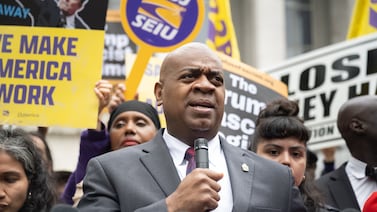Sign up for Chalkbeat Indiana’s free daily newsletter to keep up with Indianapolis Public Schools, Marion County’s township districts, and statewide education news.
Update: The Indiana legislative session ended on March 8, 2024. Here are the education bills that did and didn’t pass.
Indiana House lawmakers have amended a Senate bill focused on chronic absenteeism to require school districts to prohibit habitually truant students from participating in extracurricular activities.
They also altered Senate Bill 282 to add instructions that school officials must report habitually truant students to the prosecutors’ office, and that prosecutors must notify parents that they’ve filed affidavits related to their students’ absenteeism.
But in a policy change not directly related to absenteeism, legislators also amended the bill on Tuesday to provide new protections for teachers who are targeted by unsubstantiated complaints from parents.
Policymakers signaled before the start of this session, which ends March 14, that they wanted to address high rates of chronic absenteeism in Indiana schools. But lawmakers have struggled to articulate how they want to address the issue comprehensively.
The Senate bill primarily deals with student absenteeism. It would require schools to meet with parents and offer wraparound services to address elementary students’ absenteeism.
But an amendment by Democratic Rep. Tonya Pfaff in the last House education committee meeting of the 2024 session added protections for school employees facing unsubstantiated complaints of misconduct.
If an allegation were dismissed or found to be unsubstantiated, a principal would have to inform the school employee and the student and their parent of this decision in writing.
Furthermore, principals would have to inform the parent or student making the allegation that a second unsubstantiated complaint within a year could result in the student being moved to another classroom, or the parent being barred from after-school activities for up to six months.
Pfaff’s amendment passed with bipartisan support.
The changes are similar to an amendment in another bill this session that would allow school employees to remove disruptive students from the classroom and prohibit them from returning.
Lawmakers scuttle plan to study older students’ absenteeism
House lawmakers also removed language from SB 282 that would have asked lawmakers to study the issue of absenteeism over the summer. The bill’s author, GOP Sen. Stacy Donato, said the purpose of this study was to find solutions for truancy among older students.
But Rep. Bob Behning, the Republican chair of the House education committee, said House Speaker Todd Huston requested that bills not contain summer study committee language. Legislative leadership could still decide to study the issue further.
Lawmakers also removed nonpublic schools from the provisions of the bill, and added language that parents can ask a representative — like a doctor or therapist — to provide input at an attendance meeting with their student’s school.
SB 282 is moving forward to a full House vote as the 2024 session quickly draws to a close.
Notably, the House committee did not hear Senate Bill 128, which would have required schools to seek approval from their school boards for sex education material, and then publish the information online. The committee’s decision effectively killed the bill.
You can track SB 282 on the General Assembly’s website.
Aleksandra Appleton covers Indiana education policy and writes about K-12 schools across the state. Contact her at aappleton@chalkbeat.org.







